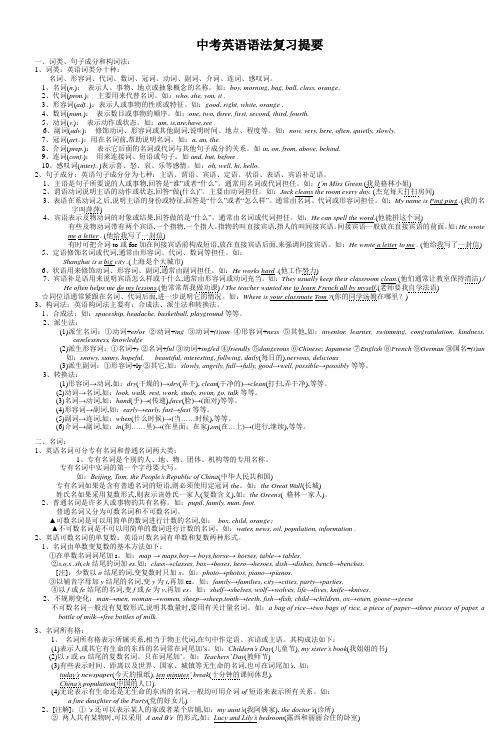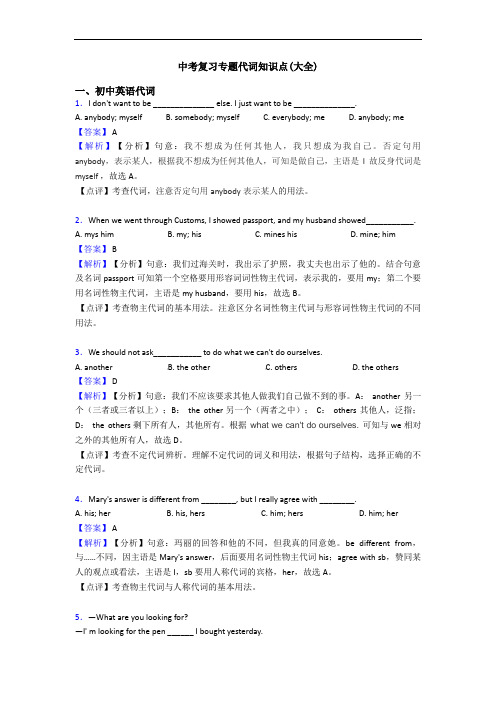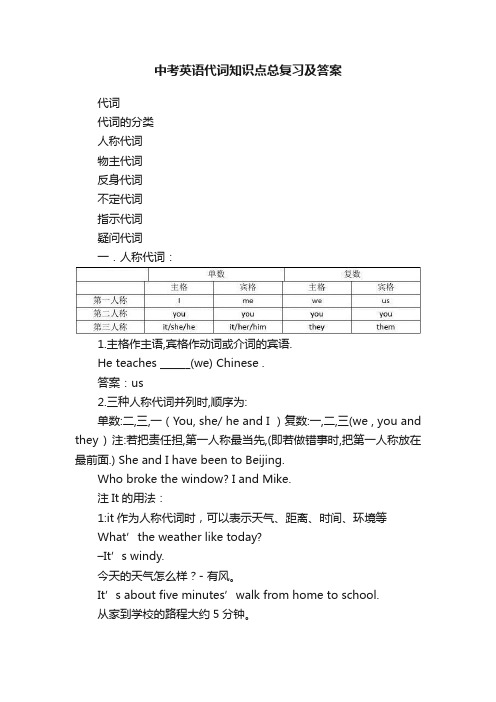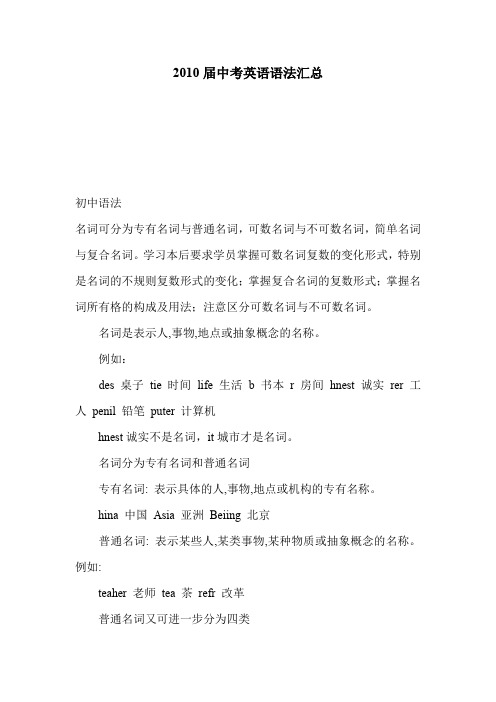2010届中考英语代词考点集汇
2010中考英语知识总结

2010中考英语知识总结本资料为特级教师原创(一)形容词和副词I.要点A.形容词1、形容词的用法形容词是用来修饰、描绘名词的,通常在句中作定语、表语或宾补,有时还可作状语。
如:He is honest and hardworking.I found the book interesting.某些形容词与定冠词连用表示一类人作主语时,谓语通常用复数形式。
如:The rich and the poor live in different parts of the city.The English like to be with their families.多个形容词作定语修饰名词的顺序:冠词+序数词+基数词+性质状态(描述性)+形状大小+新旧老少+颜色+国籍+材料+名词。
如:the second five interesting big new red Chinese wall papers.2、形容词比较等级的形式(1)规则形式一般说来,单音节词及少数双音节词在后加-er; --est 来构成比较级和最高级;其他双音节词及多音节词在前加more, most.如:great-greater-greatestbusy-busier-busiestimportant-more important-(the)most important(2)不规则形式good (well)-better-bestbad (ill)-worse-worstmany (much)-more-mostlittle-less-least(3)形容词比较等级的用法①表示两者的比较,用形容词的比较级+than. 如:He is cleverer than the other boys.This one is more beautiful than that one.②表示两者以上的比较,用"the +形容词最高级(+名词)+of(in) …"如:He is the cleverest boy in his class.③表示两者是同等程度,用"as +形容词原级+as". 如:He is as tall as I.I have as many books as you.④越…越…例如:The more I learn, the happier I am.⑤You can never be too careful. 越小心越好又如:You can never praise the teacher too highly.你怎么赞扬这个老师也不过分。
2010年中考英语语法复习提要

中考英语语法复习提要一、词类、句子成分和构词法:1、词类:英语词类分十种:名词、形容词、代词、数词、冠词、动词、副词、介词、连词、感叹词。
1、名词(n.):表示人、事物、地点或抽象概念的名称。
如:boy, morning, bag, ball, class, orange.2、代词(pron.):主要用来代替名词。
如:who, she, you, it .3、形容词(adj..):表示人或事物的性质或特征。
如:good, right, white, orange .4、数词(num.):表示数目或事物的顺序。
如:one, two, three, first, second, third, fourth.5、动词(v.):表示动作或状态。
如:am, is,are,have,see .6、副词(adv.):修饰动词、形容词或其他副词,说明时间、地点、程度等。
如:now, very, here, often, quietly, slowly.7、冠词(art..):用在名词前,帮助说明名词。
如:a, an, the.8、介词(prep.):表示它后面的名词或代词与其他句子成分的关系。
如in, on, from, above, behind.9、连词(conj.):用来连接词、短语或句子。
如and, but, before .10、感叹词(interj..)表示喜、怒、哀、乐等感情。
如:oh, well, hi, hello.2、句子成分:英语句子成分分为七种:主语、谓语、宾语、定语、状语、表语、宾语补足语。
1、主语是句子所要说的人或事物,回答是―谁‖或者―什么‖。
通常用名词或代词担任。
如:I‘m Miss Green.(我是格林小姐)2、谓语动词说明主语的动作或状态,回答―做(什么)‖。
主要由动词担任。
如:Jack cleans the room every day. (杰克每天打扫房间)3、表语在系动词之后,说明主语的身份或特征,回答是―什么‖或者―怎么样‖。
中考代词知识点总结

中考代词知识点总结一、人称代词人称代词用来表示说话人、听话人和与说话人或听话人有关的人或事物。
在中考英语考试中,人称代词的使用是非常常见的。
1. 主格形式:I, you, he, she, it, we, they。
例如:I am a student.You are my friend.He is a teacher.She is my sister.It is a cat.We are in the same class.They are good students.2. 宾格形式:me, you, him, her, it, us, them。
例如:He likes me.I see you.We help him.She loves her.It follows it.They call us.I miss them.3. 形容词性物主代词:my, your, his, her, its, our, their。
例如:This is my book.Is this your dog?That is his bike.Her name is Lily.Its color is yellow.Our teacher is strict.Their parents are doctors.4. 名词性物主代词:mine, yours, his, hers, its, ours, theirs。
例如:This book is mine.Is this dog yours?The bike is his.The cat is hers.The house is ours.The toys are theirs.5. 反身代词:myself, yourself, himself, herself, itself, ourselves, themselves。
例如:I see myself in the mirror.You should do it yourself.He hurt himself.She enjoys herself.It cleans itself.We find ourselves lost.They talk to themselves.二、指示代词指示代词用来指示人或物,常见的指示代词有this, that, these, those等。
中考初中英语代词完整归纳

中考初中英语代词完整归纳一、选择题1.You are supposed to bring _________ to his attention that the journey will be really tiring. A.that B.it C.this D.you2.Though I agree with most of what you said, that doesn't mean I agree with _________. A.anything B.nothing C.everything D.something 3.—Do you know whose books they are on the desk?—I don't know. They' re not ________. Ask Andrew, please.A.mine B.me C.my D.I4.Jeff dreams of becoming a detective like Sherlock Homes. He thinks there is ________ more exciting than solving a mystery.A.everything B.something C.anything D.nothing5.—This book on animals is interesting. I’d like ________. Where did you buy it, Simon?—In the bookshop near my school.A.it B.this C.that D.one 6.—Today’s Yangtze Evening, please.—There’s only one copy left. Would you like ________?A.they B.them C.it D.one7.Believe in yourself. Do this and no matter where you are, you will have ________ to fear. A.nothing B.something C.anything D.everything 8.Online short video apps like Douyin make ________ more convenient to learn about the world at home.A.it B.this C.one D.that9.—The apples are quite delicious! Can I have one more?—Sorry, there is ________ left, what about some oranges?A.none B.no one C.nothing D.nobody 10.We’d like to recommend Millie a s the Young Star because of ________ effort and kindness. A.our B.ours C.her D.hers11.It is wrong to copy others’ answers. Do homework by ________, boys!A.yourself B.yourselves C.myself D.ourselves 12.—Is this ________ bike?—No, it isn’t. I left my bike at home.A.my B.your C.his D.her13.They all think ________ to create such beautiful music with the transparent cups.A.it amazed B.that amazed C.it amazing D.that is amazing 14.My mother tried to cook ________ for me when I studied in New Zealand.A.different something B.different anything C.something different D.anything different 15.I can take good care of myself. I do not depend on ________.A.anybody B.everybody C.nothing D.something 16.Miss Liu is kind enough to help us whenever she is needed. We all like ______.A.she B.her C.him D.them17.—Are these cars made in Japan?—Yes, and they’re much cheaper than ___________ in American.A.that B.those C.it D.ones18.It’s very convenient ______ us to buy train tickets now because we can buy them either from the station or on the Internet.A.to B.of C.by D.for19.—Could you tell me how many classes you have on Friday afternoon?—___________. We can take part in activities in any club we like.A.None B.Nothing C.Neither D.Either20.—Did you go to the popular tourist attraction yesterday?—Yes. After waiting for hours to get in, I found ________ too tired to finish the tour.A.it B.me C.itself D.myself21.As the old saying goes, politeness costs nothing and gains ________.A.nothing B.anything C.everything D.something22.The key to success is to start where you are, not when things get better, not if things were different, nor if you had what ________ else has.A.something B.anything C.somebody D.anybody23.He thinks himself ________, but we think him ________.A.somebody, anybody B.somebody, nobody C.anybody, somebody D.anybody, nobody 24.— The TV series Love Designer is the most romantic drama I have ever seen.—I’m afraid it’s not ________ cup of tea.A.anybody’s B.everybody’s C.somebody’s D.nobody’s25.—All of us will visit Beijing Daxing International Airport next week.—Great! ________ of us has been there before and we want to know more about the local culture. A.None B.Either C.Both D.All26.—This book on Yancheng’s history is interesting. I’d like______. Where did you buy it, Tom? —In the Amazon Bookstore.A.it B.this C.that D.one27.My parents have made ________ a habit to go out for a walk around Xuanwu Lake.A.this B.it C.that D.one28.Dora always comes up with new ideas, but ________ is of any value to me.A.none B.nothing C.no one D.neither 29.—Have you prepared ________ for the picnic tomorrow?—-No, except the drinks.A.nothing B.anything C.everything D.something30.The teacher shared the photos of our school trip on her WeChat Moments. We can see them for ________.A.herself B.himself C.ourselves D.themselves 31.Think twice and make the decision. _______ else can do it for you.A.Somebody B.Nobody C.Everybody D.Anybody 32.—Though the film Hi, mom has achieved a great success, it isn’t liked by ________.—I think so. It is hard to please all.A.nobody B.somebody C.everybody D.anybody 33.—Excuse me, I want to buy a birthday gift for my brother.—Here are some gifts for boys. You can choose ________ for him.A.it B.one C.that D.them 34.—Tickets for Friday.—Sorry, we’ve got ________ left.A.none B.nothing C.no D.no one35.The weather in Beijing is cooler than ________ in Guangzhou.A.this B.that C.it D.one 36.—David, I have ________ to tell you.—Great! I’m excited to hear our country has made prog ress in exploring the space. A.something important B.anything important C.important something D.important anything37.If something is wrong, fix it. Do not worry. Worry never fixes ________.A.something B.anything C.nothing D.everything 38.Wu Xinhai, a stay-at-home dad in Beijing, said: “I want my kids to have a different childhood from ________.”A.my B.me C.myself D.mine 39.—Daniel, is this your mobile phone?—No. ________is on the table.A.I. B.me C.my D.mine40.The sheep are eating grass on the hill. How happy ________ look!A.it B.its C.they D.them【参考答案】一、选择题1.B解析:B【详解】句意:你应该让他注意到这次旅行会很累。
中考代词知识点梳理

中考代词知识点梳理篇一:中考代词知识点代词知识点考点一、人称代词分为主格和宾格主格:在句子中充当主语,是动作的执行者。
宾格:在句子中充当宾语,是动作的承担者。
用法:动词、介词后面用人称代词的宾格(动介之后用人宾),在句中作表语时常用宾格He often beats me. / Look at her, her dress is very beautiful. / It’s me.★★it的用法:①作形式主语eg:It is very important to learn English well. 真正的主语是后面的to learn English well —To Learn English well is very important.②作形式宾语eg:I found it is important to learn English well. 真正的宾语是后面的to learn English well —I found to learn English well is important.③指代时间、天气、人等eg:It’s 9 o’clock. / It’s Monday today. / It was sunny yesterday. / It’s me.④用于强调句中eg:It is Li Ming who is a dictor.⑤用于前面提到的单数名词eg:I have a pen, it is black.★两个或两个人称代词连用时,要注意:单数时—2-3-1(你-他-我)自己始终放在最后面eg:You, he and I will go to Badong. / The teacher wants you, Jim and me to have a rest. 复数时—1-2-3(我-你-他)eg:We, you and the twins want to eat some candy.考点二、物主代词形容词性物主代词(形物代)& 名词性物主代词(名物代)用法:① 是用形物代还是名物代,要看它后面紧跟的那个词。
中考复习专题代词知识点(大全)

中考复习专题代词知识点(大全)一、初中英语代词1.I don't want to be ______________ else. I just want to be ______________.A. anybody; myselfB. somebody; myselfC. everybody; meD. anybody; me【答案】 A【解析】【分析】句意:我不想成为任何其他人,我只想成为我自己。
否定句用anybody,表示某人,根据我不想成为任何其他人,可知是做自己,主语是I故反身代词是myself,故选A。
【点评】考查代词,注意否定句用anybody表示某人的用法。
2.When we went through Customs, I showed passport, and my husband showed___________.A. mys himB. my; hisC. mines hisD. mine; him【答案】 B【解析】【分析】句意:我们过海关时,我出示了护照,我丈夫也出示了他的。
结合句意及名词passport可知第一个空格要用形容词词性物主代词,表示我的,要用my;第二个要用名词性物主代词,主语是my husband,要用his,故选B。
【点评】考查物主代词的基本用法。
注意区分名词性物主代词与形容词性物主代词的不同用法。
3.We should not ask___________ to do what we can't do ourselves.A. anotherB. the otherC. othersD. the others【答案】 D【解析】【分析】句意:我们不应该要求其他人做我们自己做不到的事。
A:another 另一个(三者或三者以上);B:the other另一个(两者之中);C:others 其他人,泛指;D:the others剩下所有人,其他所有。
中考英语专项复习(代词)精选全文

精选全文完整版(可编辑修改)中考英语专项复习(代词)代词是用来代替名词或名词词组的词,因此代词在句子中的功能和名词一样,可作主语、宾语和表语,有些代词还可修饰名词。
英语代词可分为人称代词、物主代词、指示代词、反身代词、疑问代词、关系代词、连接代词、不定代词、相互代词等九种。
现把学过的六种代词介绍如下:1.人称代词表示“我”、“你”、“他”、“她”“它”“我们”、“你们”、“他们”等的词,叫做人称代词。
人称代词的排列有以下几种;①我、你、他第二人称→第三人称→第一人称即:you,he and I②她和老师名词→人称代词即:the teacher and she③我、他和一些别的人人称代词→其他代词即:he,I and some others④第三人称两性(性别)并用时,如:他和她;即:he and she2.物主代词物主代词表示所有关系,分为形容词性和名词性两种,形容词性物主代词作定语,名词性物主代词作主语、宾语和表语。
形容词性物主代词后要跟名词。
名词性物主代词可以单独使用,其作用相当于一个形容词加上一个名词。
物主代词有人称和数的区别。
例:This is my dictionary.Yours (=Your dictionary) is on the desk.一Is this your classroom?—No.It's theirs(=their classroom).3.反身代词表示动词所表达的动作反回到施动者本身,一般是由第一、二人称的形容词性物主代词或第三人称代词的宾格加上self (复数selves) 构成,起强调作用,反身代词可作动词宾语、介词宾语、同位语等。
例如:Please help yourself to some fish.(作动词宾语)He thinks more of himself than“others.(作介词宾语)I myself did it.(作同位语)I spoke to the manager himself.(作同位语)注:反身代词常接在动词enjoy, hurt, help等词后。
中考英语代词知识点总复习及答案

中考英语代词知识点总复习及答案代词代词的分类人称代词物主代词反身代词不定代词指示代词疑问代词一.人称代词:1.主格作主语,宾格作动词或介词的宾语.He teaches ______(we) Chinese .答案:us2.三种人称代词并列时,顺序为:单数:二,三,一(You, she/ he and I )复数:一,二,三(we , you and they ) 注:若把责任担,第一人称最当先,(即若做错事时,把第一人称放在最前面.) She and I have been to Beijing.Who broke the window? I and Mike.注It的用法:1:it作为人称代词时,可以表示天气、距离、时间、环境等What’the weather like today?–It’s windy.今天的天气怎么样?- 有风。
It’s about five minutes’walk from home to school.从家到学校的路程大约5分钟。
2. it 可指不知性别的婴儿或不确指性别的人.—who is the person over there?—It is the headteacher.1. --- Who is knocking at the door?--- I don’t know . I was lying in the bed and just ask who ____ was.A. heB. sheC. it2. I can’t find my hat . I don’t know where I put ____.A. oneB. itC. that3. I can’t find my hat . I think I must buy__.A. itB. oneC. that答案:CBB固定句型1. 做某事情对某人来说是…It is + adj. (+for sb.) +to do sth.It is hard for me to do this work.2. 轮到某人做…It’s one’s turn to do sth.It’s your turn to clean the room.3. 是(某人)做某事的时候了It’s time (for sb.) to do sth.It’s time for you to do the homework.4. 据说…It’s said that …It’s said that your teacher leave our school.5. 某人花费…做某事It takes sb. some time to do sth.6. 自从…以来,已经有…(时间)了。
代词知识点详解(初中英语专项复习) (12)

代词知识点详解(初中英语专项复习)考向1 人称代词口诀使用范例Mrs.Green will come here. I can't wait to see .A.himB.herC.youD.me考查人称代词主格和宾格用法时用此口诀答案解析:see表“看见”,为动词,根据大招“动介后宾”可知,其后的人称代词应该用宾格。
处指代Green夫人,所以用第三人称单数的宾格形式her.故选B.解题坑点1.“动介后宾”,注意介词后人称代词也要用宾格(例如:This book belongs to me.).2.常考teach sb.sth.,注意这里的sb.用人称代词的宾格形式,而不是使用物主代词(例如:She teaches us English.).典例The children have painted since ________ could first pick up a brush.A.they B.them C.their D.themselves【答案】A【详解】句意:孩子们从第一次拿起画笔就开始画画了。
考查代词。
they他们,主格;them他们,宾格;their他们的,形容词性物主代词;themselves 他们自己,反身代词。
空处作从句的主语,应用主格,故选A。
考向2 物主代词口诀使用范例This isn't skirt. is on the sofa.A.you;Y oursB.his;HimC.my;Mine考查名词性物主代词和形容词性物主代词的用法区别时,用此口诀解题。
答案解析:根据句意可知,两空都应该填物主代词。
第一空后面接名词skirt,根据大招“有名则形”可知,填形容词性物主代词。
第二空后面没有接名词,根据大招“无名则名”可知,填名词性物主代词。
故选C.解题坑点形容词性物主代词相当于形容词,名词性物主代词相当于名词。
名词性物主代词=形容词性物主代词+名词,例如:mine=my+名典例My sister enjoys singing and ________ favorite subject is music.A.his B.her C.your D.their【答案】B【详解】句意:我妹妹喜欢唱歌,她最喜欢的科目是音乐。
2010届中考英语语法汇总

2010届中考英语语法汇总初中语法名词可分为专有名词与普通名词,可数名词与不可数名词,简单名词与复合名词。
学习本后要求学员掌握可数名词复数的变化形式,特别是名词的不规则复数形式的变化;掌握复合名词的复数形式;掌握名词所有格的构成及用法;注意区分可数名词与不可数名词。
名词是表示人,事物,地点或抽象概念的名称。
例如:des 桌子tie 时间life 生活 b 书本r 房间hnest 诚实rer 工人penil 铅笔puter 计算机hnest诚实不是名词,it城市才是名词。
名词分为专有名词和普通名词专有名词: 表示具体的人,事物,地点或机构的专有名称。
hina 中国Asia 亚洲Beiing 北京普通名词: 表示某些人,某类事物,某种物质或抽象概念的名称。
例如:teaher 老师tea 茶refr 改革普通名词又可进一步分为四类1) 个体名词(Individual Nuns):表示单个的人和事物。
hrse 马ar 汽车r 房间apple 苹果fan 风扇piture 照片2) 集体名词(lletive Nuns): 表示一群人或一些事物的名称。
peple 人们fail 家庭ar 军队gvernent政府grup 集团3) 物质名词(aterial Nuns):表示物质或不具备确定形状和大小的个体的物质。
fire 火steel 钢air 空气ater 水il 牛奶4)抽象名词(Abstrat Nuns):表示动作,状态,品质或其他抽象概念。
labur 劳动health 健康life 生活friendship友情patiene耐力名词又可分为可数名词(untable Nuns)和不可数名词(Ununtable Nuns)。
_______________________________________专有名词个体名词可数名词集体名词普通名词物质名词不可数名词抽象名词可数名词有单,复数之分,表示一个或多个。
中考英语知识点代词总结

中考英语知识点代词总结一、代词的分类代词根据其在句子中所起的作用和指代的内容可以分为人称代词、物主代词、反身代词、指示代词、疑问代词、不定代词、连接代词等几种类型。
1. 人称代词人称代词根据其所指的人称的不同可以分为主格、宾格和物主形式。
主格人称代词作主语,宾格人称代词作宾语,而物主代词则表示所属关系。
主格:I, you, he, she, it, we, they宾格:me, you, him, her, it, us, them物主代词:my/mine, your/yours, his, her/hers, its, our/ours, their/theirs2. 物主代词物主代词用来表示所属关系,分为形容词性物主代词和名词性物主代词。
形容词性物主代词用在名词前修饰名词,而名词性物主代词则直接代替名词。
形容词性物主代词:my, your, his, her, its, our, their名词性物主代词:mine, yours, his, hers, its, ours, theirs3. 反身代词反身代词用来指代动作的执行者与动作的承受者是同一人或同一事物,表示主语指向主语本身。
反身代词:myself, yourself, himself, herself, itself, ourselves, yourselves, themselves4. 指示代词指示代词用来指示人、事、物或概念,分为近指和远指。
近指代词:this, these远指代词:that, those5. 疑问代词疑问代词用来引导疑问句,提问人或事物的身份、数量、性质等,常用于特殊疑问句中。
疑问代词:who, whom, whose, what, which6. 不定代词不定代词用来代替泛指或不确定的人、事或物,常用于肯定句、否定句、疑问句等中。
不定代词:some, any, no, every, each, all, both, either, neither, other, another, few, several, many, much, a little, a few, a lot of, lots of, some, any, none, every, all, both, either, neither7. 连接代词连接代词用来连接两个句子或从句,引导定语从句或状语从句。
中考英语代词语法知识汇总(完整版)

中考英语代词语法知识汇总【名师精讲9类代词用法,值得下载学习】代词的分类:人称代词、物主代词、反身代词、指示代词、关系代词、疑问代词、连接代词和不定代词等。
1、人称代词:人称代词代替人和事物的名称,分为主格和宾格两种形式。
I often go shopping on Sundays.(星期天我常去购物)Are they from Brazil?(他们是巴西人吗?)Where have they gone?(他们上哪儿去了?)It’s he!(是他!)(2)宾格用来作及物动词或者介词的宾语。
Who teaches you English this year?(今年谁教你们的英语?) Help me!(救救我!)We often write letters to her.(我们常给他写信)(3)人称代词作表语或者放在比较状语从句连词than或as 之后时,可以用主格形式,也可以用宾格形式,口语中大多用宾格。
–It’s I/me.(是我。
)(4)三个不同人称同时出现,或者主语中包含“我”时,按照“you→he→I”的顺序表达。
Both he and I are working at that computer company.(我和他都在那家电脑公司上班)–Who will go there?(谁要去那儿?)–You and me.(你和我)(5)人称代词it除了可以指人指物之外,还可以表示“时间、天气、温度、距离、情况”等含义,此外还可以作“非人称代词”使用,替代作主语或者宾语的不定式、动名词或者名词性从句。
--What’s the time?(几点啦?)–It’s 12:00.(12点)It’s a long way to go.(那可要走好长的路)It took him three days to clean his house..(打扫屋子花了他三天的时间)It is very clear that the public want to know when these men can go into space(很显然,公众想知道这些人什么时候能进入太空)2、物主代词:说明事物所属关系的代词,分为形容词性和名词名词。
中考英语代词语法知识汇总(完整版)

中考英语代词语法知识汇总(完整版)Summary of Pronoun Grammar Knowledge for r High School English ExamThis article introduces 9 categories of pronouns: personal pronouns。
possessive pronouns。
reflexive pronouns。
demonstrative pronouns。
relative pronouns。
interrogative pronouns。
connecting pronouns。
and indefinite pronouns.1.Personal pronouns are used to replace the names of people and things。
and are XXX.There are three singular forms: first person。
second person。
and third person。
and two plural forms: first and second person。
The XXX.1) The subjective form is used as the subject or predicate of a sentence.XXX: I often go shopping on Sundays.2) The objective form is used as the object of a transitive XXX.XXX: Who teaches you English this year?3) When XXX like "than" or "as," the XXX form can be used。
In spoken language。
2010届中考英语语法基础复习7

【冲击 2010 年中考英语精选复习资料】语法基础-7 代词的定义 :取代名词 ,形容词或数词的词就是代词。
它们指人称和事物 ,但又不说出他们的名字 ,因此叫做人称代词。
代词的分类 :代词可分为八类 ,他们是 :1)人称代词 5)疑问代词2)物主代词 6)连结代词3)指示代词 7)关系代词4)反身代词 8)不定代词代词的用法 :1)人称代词 :表示 "我,你,他,我们 ,你们 ,他们等 " 的词叫做人称代词。
人称代词有人称 ,数和格之分。
主格宾格主格宾格第一人称 I me we us第二人称 you you you you第三人称 he,she,it his,her,it theythem人称代词可用作主语 ,表语 ,宾语以及介词的宾语。
I am a worker, I work in the factory.我是一个工人 ,我在工厂工作。
You are a good teacher.你是一位优异教师。
She is a little girl.她是一个小女孩。
It's a heavy box, I can't carry it.这是一个重盒子 ,我搬不动。
It's me. Open the door quickly.是我 ,快开门。
Don't tell him about it.不要告诉他这件事情。
She is always ready to help us.她随时都在准备帮助我们。
Our teacher is very strict with us.我们的老师对我们很严格。
人称代词中几个注意的状况:第一人称单数代词 " I(我)"无论在什么地方都要大写。
I study English every day.我每日学习英语。
"we " 经常取代 " I " 表示一种同读者 ,听众或观众之间的亲近关系。
中考英语代词知识点归纳 附解析

中考英语代词知识点归纳附解析一、选择题1.—Do you have ________else to say for your mistake?—________but sorry.A.anything; Something B.something; EverythingC.anything; Nothing D.something; Anything2.—Excuse me, I want to buy a birthday present for my younger sister.—OK. We have new kinds of toys for girls. You can choose for her.A.one B.it C.them D.that3.—Do you know the percentage of the people who want to leave the Earth in China?—I think there is ________. In fact, there is ________ on other planets that can help people survive.A.nothing; none B.none; nothing C.nobody; none D.none; no one 4.— Lucy, do you know whose wallet it is on the table?—Sorry, I don’t know. I asked many people, but ________ knew.A.nobody B.everybody C.anybody D.somebody5.Bob recommended me several foreign films, but ________ was to my taste.A.neither B.no one C.none D.nothing 6.Online short video apps like Douyin make ________ more convenient to learn about the world at home.A.it B.this C.one D.that7.—Wow! Jim plays the piano so well.—Not ________ can play it like this. He works hard at it.A.everybody B.somebody C.nobody D.anybody 8.Robots are created by humans for humans. There’s ________ to be afraid of. A.something B.nothing C.everything D.anything 9.—This book on animal s is interesting. I’d like ________. Where did you buy it, Simon?—In the bookshop near my school.A.it B.this C.that D.one10.—Is this ________ bike?—No, it isn’t. I left my bike at home.A.my B.your C.his D.her11.Jeff dreams of becoming a detective like Sherlock Homes. He thinks there is ________ more exciting than solving a mystery.A.everything B.something C.anything D.nothing 12.—Which of the two dresses will you choose for the party?—________ of them is suitable for a birthday party. They are too formal.A.Neither B.None C.Either D.Both13.I can take good care of myself. I do not depend on ________.A.anybody B.everybody C.nothing D.something14.It’s known to all that the Chinese are famous for ________ hard work and wisdom.A.they B.them C.their D.themselves 15.—Are these cars made in Japan?—Yes, and they’re much cheaper than ___________ in American.A.that B.those C.it D.ones16.Wearing red makes________easy________us to take action.A.it; for B.this; of C.that; for D.it; of17.—Could you tell me how many classes you have on Friday afternoon?—___________. We can take part in activities in any club we like.A.None B.Nothing C.Neither D.Either 18.Though I agree with most of what you said, that doesn't mean I agree with _________. A.anything B.nothing C.everything D.something 19.—Sam, there are so many spelling mistakes in your paper. You should try not torepeat________.—Sorry, Mr. White. I'll be more careful from now on.A.it B.its C.them D.theirs 20.—Jack, you left your coat in the playground again?—It isn’t ________. Look, my coat is in my bag.A.mine B.my C.your D.yours21.The weather in Beijing is cooler than ________ in Guangzhou.A.this B.that C.it D.one22.—Jeffrey always remained calm and mastered his own feelings.—No wonder he is a ________.A.somebody B.anybody C.nobody D.everyone23.The key to success is to start where you are, not when things get better, not if things were different, nor if you had what ________ else has.A.something B.anything C.somebody D.anybody 24.Some friends tried to calm down Mr. and Mrs. White and help solve their problem without hurting the feeling of ________, but failed.A.none B.either C.both D.neither25.As a child, I would sit for hours under an old tree doing ________, which was simply day dreaming.A.nothing B.everything C.something D.anything 26.—Mary, is this ________ blue bike?—No, ________ is a black one.A.your; my B.your; mine C.yours; my D.yours; mine 27.—This book on Yancheng’s history is interesting. I’d like______. Where did you buy it, Tom? —In the Amazon Bookstore.A.it B.this C.that D.one28.The sheep are eating grass on the hill. How happy ________ look!A.it B.its C.they D.them29.Life is like a one-way street. ________ will happen________ the same way again. A.Nothing; by B.Nothing;/ C.None; in D.None;on 30.—Excuse me, I want to buy a birthday gift for my brother.—Here are some gifts for boys. You can choose ________ for him.A.it B.one C.that D.them31.The girl got a new bike from her father and she loves ________ colour very much.A.it B.itself C.its D.it’s 32.—David, I have ________ to tell you.—Great! I’m excited to hear our country has made progress in exploring the space. A.something important B.anything important C.important something D.important anything33.—Excuse me, is there a supermarket nearby?—I know ________. I will take you there.A.it B.one C.some D.that34.— Have you got any books on the differences between Chinese and Western festivals? I want to borrow one.— Yes, here you are. But you must return _______by Sunday.A.one B.it C.this D.that35.—Are there any air tickets to Hong Kong?—Sorry. There is ________ left.A.nothing B.none C.nobody D.no one36.Wu Xinhai, a stay-at-home dad in Beijing, said: “I want my kids to have a different childhood from ________.”A.my B.me C.myself D.mine 37.—Daniel, is this your mobile phone?—No. ________is on the table.A.I. B.me C.my D.mine38.—Have you prepared ________ for the picnic tomorrow?—-No, except the drinks.A.nothing B.anything C.everything D.something 39.—Which would you like to choose for your PE entrance exam, basketball or volleyball?—________. I prefer football.A.Both B.Either C.None D.Neither40.The teacher shared the photos of our school trip on her WeChat Moments. We can see them for ________.A.herself B.himself C.ourselves D.themselves【参考答案】一、选择题1.C解析:C【详解】句意:——对于你的错误你还有什么要说的吗?——只有抱歉。
- 1、下载文档前请自行甄别文档内容的完整性,平台不提供额外的编辑、内容补充、找答案等附加服务。
- 2、"仅部分预览"的文档,不可在线预览部分如存在完整性等问题,可反馈申请退款(可完整预览的文档不适用该条件!)。
- 3、如文档侵犯您的权益,请联系客服反馈,我们会尽快为您处理(人工客服工作时间:9:00-18:30)。
中考英语代词考点集汇、讲解和训练【考点直击】1. 人称代词主格、宾格形式及其主要用法;2. 名词性物主代词与形容词性物主代词的形式、区别及其主要用法;3 反身代词的形式、意义及其主要用法;4 常见不定代词的一般用法;5. 指示代词的一般用法,并了解其在上下文中的指代用法;6. 相互代词的基本用法;7. 疑问代词的基本用法。
8. 关系代词的基本用法。
【名师点睛】代词是代替名词、形容词和数词的词。
按其意义、特征及其在句中的作用分为:人称代词、物主代词、指示代词、反身代词、相互代词、疑问代词、不定代词和关系代词等。
一. 人称代词1.人称代词的人称、数和格,如下表所示。
2.人称代词有主格和宾格之分。
通常主格作主语,宾格作宾语。
如:I like table tennis. (作主语)Do you know him?(作宾语)3.人称代词还可作表语。
作表语时用宾格。
如:---Who is knocking at the door?---It’s me.4.人称代词在than之后与其他人或事物进行比较时,用主格和宾格都可以。
如:He is older than me.He is older than I am.二. 物主代词1.表示所有关系的代词叫物主代词。
物主代词分形容词性物主代词和名词性物主代词,如下表所示。
2. 形容词性物主代词的作用相当于形容词,可在句中作定语。
例如:Our teacher is coming to see us.This is her pencil-box.3. 名词性物主代词的作用相当于名词,在句中可用作主语、宾语和表语。
Our school is here, and theirs is there.(作主语)--- Is this English-book yours? (作表语)--- No. Mine is in my bag.I've already finished my homework. Have you finished yours? (作宾语)三. 指示代词指示代词包括:this,that,these,those。
1. this和these一般用来指在时间或空间上较近的事物或人,that和those则指时间和空间上较远的事物或人,例如:This is a pen and that is a pencil.We are busy these days.In those days the workers had a hard time.2. 有时that和those指前面讲到过的事物,this 和these则是指下面将要讲到的事物,例如:I had a cold. That's why I didn't come.What I want to say is this ; pronunciation is very important in learning English.3. 有时为了避免重复提到的名词,常可用that或those代替,例如:Television sets made in Beijing are just as good as those made in Shanghai.4. this 在电话用语中代表自己,that 则代表对方。
例如:Hello! This is Mary. Is that Jack speaking?四. 反身代词英语中用来表示"我自己","你自己","他自己","我们自己","你们自己"等意义的代词称为反身代词,也有人称之为自身代名词,其形式如表所示。
反身代词可以在句中作宾语,表语,同位语。
1. 作宾语,表示动作的承受者就是动作的发出者,主语和宾语指同一个人或一些人。
He called himself a writer.Would you please express yourself in English?2. 作表语。
It doesn't matter.I'll be myself soon.The girl in the news is myself.3. 作主语或宾语的同位语,表示亲自或本人。
I myself washed the clothes.(=I washed the clothes myself.)(作主语同位语)You should ask the teacher himself.(作宾语同位语)五. 不定代词不是指明代替任何特定名词的代词叫做不定代词,在句中可作主语、表语、宾语和定语。
现将几个常用的不定代词举例说明如下:1. some与any的区别1)some多用于肯定句,表示“一些,几个”作形容词时,后面可以接①不可数名词+单数动词;②可数名词+复数动词。
Look! Some of the students are cleaning the library.. Some rice in the bag has been sold out.2)any多用于疑问句、条件句和否定句中,表示“一些,任何”用作形容词时,后面可以接①不可数名词+单数动词;②可数名词+复数动词。
If you have any questions, please ask me.There isn't any orange in the bottle.Have you got any tea?3)any和some也可以作代词用,表示“一些”。
any多用于疑问句或否定句中,some多用于肯定句中。
How many people can you see in the picture?I can't see any.If you have no money, I'll lend you some.注意:与some, any结合的词如something, somebody, someone, anything, anyone, anybody在肯定句、否定句、疑问句、条件句中的用法,大致和some, any的用法相同。
2. few, a few, little, a little在用法上的区别1)用作形容词:1)other可以作形容词用,后面可以跟单数或复数名词,意思是“其他的、别的”。
Where are his other books?I haven't any other books except this one.2)other也可以用作代词,与冠词the连用构成“the other”,表示两个人或物中的“另一个”。
常与one搭配构成“one ..., the other ...”句型。
He has two brothers. One is 10 years old , the other is 5 years old.She held a ruler in one hand and an exercise-book in the other.3)other作代词用时,可以有复数“others”,泛指“另外的人或物”。
常与some搭配构成“some ...., others ...”句型。
Some went to the cinema, others went swimming.This coat is too large. Show me some others, please.4)“the others”表示特指某范围内的“其他的人或物”。
We got home by 4 o'clock, but the others didn't get back until 8 o'clock.In our class only Tom is English, the others are Chinese.5)another可以作形容词用,修饰后面的名词,意为“另一个”,还可以跟代词one.You can see another ship in the sea, can't you?Mary doesn't want to buy this skirt. Would you please show her another one? 6)another也可以作代词用,表示“另一个”。
I'm still hungry after I've had this cake. Please give me another.4. every与each的区别。
The teacher gave a toy to each child.Each ball has a different colour.当我们说each child, each student或each teacher时,我们想到的是一个人的情况。
而当我们说every child和every student时,我们想到的是全体的情况,every的意思与all 接近,表示他们都如此。
Every student loves the English teacher. = All students love the English teacher. Every child likes playing. = All children like playing.5. all和both的用法。
1)all指三者以上,或不可数的东西。
谓语动词既可以用单数,也可以用作复数。
在句中作主语、表语、宾语、同位语和定语。
All of us like Mr. Pope. 我们都喜欢Pope先生。
(作主语)= We all like Mr. Pope. (作同位语)All the water has been used up. (作主语)That's all for today. (作表语)Why not eat all (of) the fish? (作宾语)All the leaders are here. (作定语)2)both作代词。
①与其他名词或代词并列出现,表示“两个都”。
Lucy and Lily both agree with us.They both passed on their sticks at the same time.How are your parents? They're both fine.②与“of +代词(或名词)”连用,表示“两者都”。
Both of them came to see Mary.Both of the books are very interesting.③单独使用,表示“两者(都)”。
